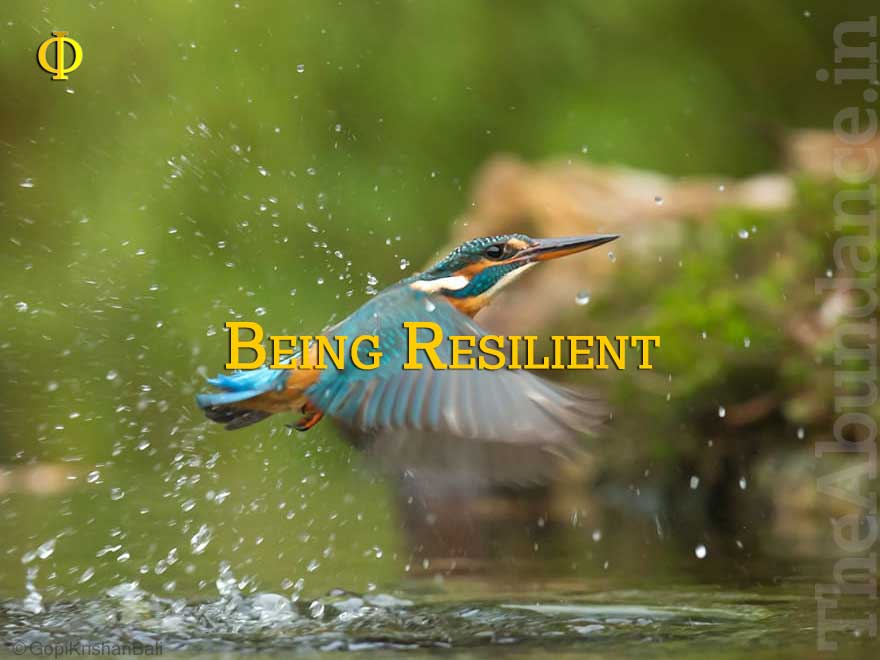Resilience is the individual’s ability to adapt to challenges of life and difficult situations at workplace. It is our innate potential to bounce back from difficult, traumatic or bad experiences in life.
The Source | The Abundance Lab
Resilience comes from the lessons learnt from the challenges and skills developed while going through these difficult situations. We have an opportunity to evolve as we flow and grow up while we face all of our difficulties whatever they are.
The main characteristics of an individual who has resilience are self-awareness, and self-control. It enhances when we develop problem-solving skills, and build social support system. Resilient people are consciously aware of the present situations, their emotional reactions/responses, and the behavior of those around them.
Is Resilience a Skill?
Yes, resilience is a skill, like riding a bicycle or driving a car. The more we practice, the better we’ll be. It is our ability to successfully adapt to stressors, maintaining psychological well-being in the face of adversity. As it involves our emotions, behaviors, thoughts, and actions / reactions for any situation, it can be learned and developed by everyone. It is not at all a set trait or special quality attribute that people either have or don’t have. We all have innate ability to learn it, understand it and apply it in our life or at workplace.
How to increase our resilience?
Here are some ways to increase your resilience:
- Being Self-Aware: Maintain a sense of open perspective. When in difficult situations – ASK yourself,
“How big is this problem really?” and
“What do I need to do?” or “How I can resolve the issues?”
Remember not to blow things out of proportion or escalate it further, remind yourself of the good in your life and that things really will change. - Choose Consciously: Recognize that you always have a Choice in how you handle challenges. You can’t control what happens to you, but you can choose how you respond. You can choose to react to challenges and problems with hope and a positive attitude.
- Accept The Change: Change and uncertainty are part of life. When you accept this, you’ll be better able to adapt the change with openness and apply flexible approach in resolving it.
- Being Optimistic: Anticipate Challenges by focusing on the positive ways in which you can meet them rather than possible negative outcomes. This will help you feel more in control and less overwhelmed.
- Calm The Mind: Learn how to Calm Yourself First. When you feel yourself reacting to a challenge with escalating stress and anxiety, take steps to calm yourself (deep breathing, replacing negative thoughts).
- Let Go of Your Anger/Frustation: A difficult challenge can cause us to feel angry and upset. These feelings are normal, but they won’t help us move forward. Work through your anger and try to let go of negative feelings by writing about them or talking with a trusted friend.
- Face the Fears: Overcome Your Fear. All of us feel fear, especially when we’re faced with a change. But fear can hold us back from new experiences and opportunities for growth. If you are faced with a challenge that feels scary or overwhelming, start with the simplest thing you can do that takes you in the direction you want to go. Ask yourself, “What’s the smallest thing I can do to get started?” Once you’ve thought about it, do it.
- Take Timely Action: Avoid dwelling on problems. Focus on solutions instead. Figure out what you can do and then do it, one step at a time.
- Learn to Laugh: Be Happy and Laugh a lot. Even when things seem to be falling apart around you, try to find time to smile and laugh. It’s very healing and it will help you forget your worries for a few moments. Rent a movie that makes you laugh or spend time with a friend with a good sense of humor.
~Draft Post



One response
[…] element of our personality. If enthusiasm and passion are present, people tend to be more resilient when encountering obstacles. People who are passionate about what they do, rather than just […]